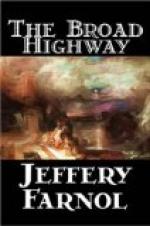“Charmian!” said I, and sprang to her side. “Oh, my love!—what is it?”
“It is—as though the shadow hung over us—darker and more threatening, Peter; as if our happiness were at an end; I seem to hear Maurice’s threat—to come between us—living or—dead. I am afraid!” she whispered, clinging to me, “I am afraid!” But, all at once, she was calm again, and full of self-reproaches, calling herself “weak,” and “foolish,” and “hysterical”—“though, indeed, I was never hysterical before!”—and telling me that I must go—that it was my duty to go to the “gentle, dying old man”—urging me to the door, almost eagerly, till, being out of the cottage, she must needs fall a-trembling once more, and wind her arms about my neck, with a great sob.
“But oh!—you will come back soon—very soon, Peter? And we know that nothing can ever come between us again—never again—my husband.” And, with that blessed word, she drew me down to her lips, and, turning, fled into the cottage.
I went on slowly up the path to meet Simon, and, as I went, my heart was heavy, and my mind full of a strange foreboding. But I never thought of the omen of the knife that had once fallen and quivered in the floor between us.
“’Twere ’is snuff-box as done it!” said Simon, staring very hard at his horse’s ears, as we jogged along the road. “‘E were a-goin’ upstairs for it, an’ slipped, ’e did. ‘Simon,’ says he, as I lifted of ’im in my arms, ‘Simon,’ says ’e, quiet like, ’I be done for at last, lad—this poor old feyther o’ yourn’ll never go a-climbin’ up these stairs no more,’ says ‘e—’never—no—more.’”
After this Simon fell silent, and I likewise, until we reached the village. Before “The Bull” was a group who talked with hushed voices and grave faces; even Old Amos grinned no more.
The old man lay in his great four-post bed, propped up with pillows, and with Prue beside him, to smooth his silver hair with tender fingers, and Black George towering in the shade of the bed-curtains, like a grieving giant.
“’Ere I be, Peter,” said the old man, beckoning me feebly with his hand, “‘ere I be—at the partin’ o’ the ways, an’ wi’ summ’at gone wrong wi’ my innards! When a man gets so old as I be, ’is innards be like glass, Peter, like glass—an’ apt to fly all to pieces if ‘e goes a-slippin’ an’ a-slidin’ downstairs, like me.”
“Are you in pain?” I asked, clasping his shrivelled hand.
“Jest a twinge, now an’ then, Peter—but—Lord! that bean’t nothin’ to a man the likes o’ me—Peter—”
“You always were so hale and hearty,” I nodded, giving him the usual opening he had waited for.
“Ay, so strong as a bull, that I were! like a lion in my youth —Black Jarge were nought to me—a cart ’orse I were.”
“Yes,” said I, “yes,” and stooped my head lower over the feeble old hand.
“But arter all, Peter, bulls pass away, an’ lions, an’ cart ‘orses lose their teeth, an’ gets wore out, for ’all flesh is grass’—but iron’s iron, bean’t it, Peter—rusts it do, but ’tis iron all the same, an’ lasts a man out—even such a ’earty chap as I were?”




